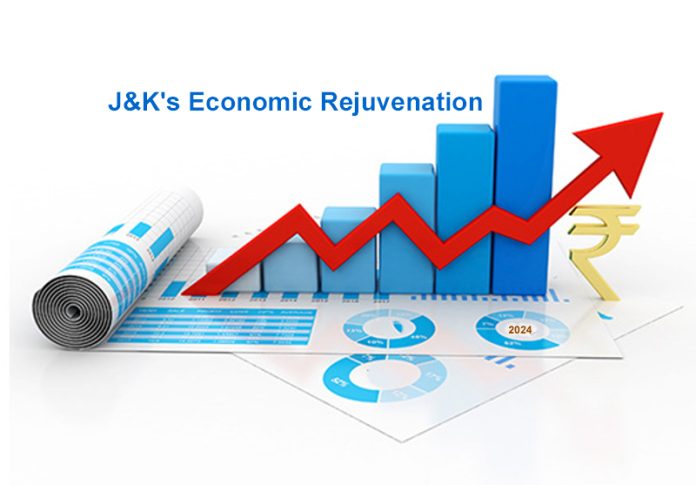In recent years, the UT of Jammu and Kashmir has undergone a remarkable transformation, marked by significant strides in economic growth, governance reform, and social development. The recent announcement by the Lieutenant Governor regarding the substantial increase in the region’s GDP from Rs 1.6 lakh crore in 2018-19 to Rs 2.64 lakh crore in 2021-22 underscores the tangible progress achieved through strategic reforms and prudent fiscal management.
One of the key factors driving this economic resurgence has been the relentless focus on implementing comprehensive reforms by the administration. The series of reforms undertaken over the past four to five years have paved the way for enhanced economic productivity and improved living standards for the people of Jammu and Kashmir. These reforms have encompassed various sectors, ranging from banking and finance to infrastructure development and governance. A prime example of the transformative impact of these reforms is the turnaround of the Jammu and Kashmir Bank. Once burdened by significant losses, the bank has now emerged as a profitable institution, registering a remarkable turnaround under the stewardship of the present administration. This success story not only demonstrates the efficacy of the reforms but also reflects the resilience and potential of the region’s economic landscape. Moreover, the administration’s commitment to fiscal prudence and accountability has been evident in its efforts to address longstanding challenges such as power debts and revenue expenditure. The significant reduction in non-performing assets of the Jammu and Kashmir Bank and the steady increase in capital expenditure signal a shift towards a more sustainable and robust economic framework.
The UT’s interim budget for the fiscal year 2024-25, presented by the Finance Minister, reflects a forward-looking approach aimed at fostering inclusive growth and development. With a proposed budget of Rs 1,18,728 crore, including substantial allocations for key sectors such as education, healthcare, infrastructure, and agriculture, the budget underscores the Government’s commitment to prioritising the welfare and prosperity of its citizens. Furthermore, the administration’s emphasis on good governance, transparency, and accountability has been instrumental in restoring public trust and confidence in the governance machinery. Initiatives such as the implementation of e-governance solutions and the promotion of grassroots democracy have enhanced citizen participation and engagement in the decision-making process, fostering a culture of inclusive and responsive governance.
In addition to economic reforms, there are consistent efforts to promote social inclusion and empowerment, particularly for marginalised communities.
It is worth noting that, amidst these transformative changes, the administration has remained steadfast in its commitment to preserving the cultural heritage and identity of Jammu and Kashmir. The allocation of resources towards tourism and culture reflects the Government’s recognition of the region’s rich cultural heritage and its potential as a tourist destination. Looking ahead, the Lieutenant Governor articulated a vision of doubling the region’s economy in the coming years, emphasising the importance of sustained growth, innovation, and investment. The administration’s focus on leveraging emerging technologies such as artificial intelligence and machine learning to enhance service delivery and governance further underscores its proactive approach towards embracing digital transformation.
The figures outlined in the budget speak for themselves, providing a clear indication of the economic trajectory and priorities set forth by the administration. However, it is imperative to address the remaining challenges and obstacles that may hinder the growth trajectory. By prioritising good governance, inclusive development, and social empowerment, the region is poised to realise its full potential and emerge as a beacon of progress and prosperity in the coming years.
Trending Now
E-Paper


